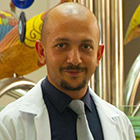Bariatric Surgery on Social Media
Bariatric surgery has popularized with low complication rate, effective weight loss, obesity rate increasing day by day, and economic attractiveness; so it has been talked on mostly on social media. However, the increasing number of patients who have had gastric sleeve or other bariatric surgeries and “the desire of doctors to perform more surgery” create some scientific and unethical conditions. A person who has already had the surgery can acknowledge their personal experiences as a scientific truth and share them with people through social media or other communication channels. Also, it is an indisputable fact that they have made financial gains from these surgeries by the name of "coordinator". Nowadays, almost every doctor has a "coordinator." But it is also crucial to state that there are people who carry out their work with medical, scientific, and ethical values.
I think social media plays an important role on the bariatric surgery and I want to share the researches on it with you. But first of all, I want to make a few suggestions for avoiding information pollution and give you tips on how to confirm the accuracy of information.
Ask Your Question Correctly
Example 1: Why I lose my hair! What should I do?
Example 2: It is a second day after stop smoking, I want to smoke a cigarette, and should I do that?
Example 3: Can I eat kebab during the porridge phase?
Avoid to post or ask such questions as they inevitably harm you. Also, many people see these questions, and of course there are some people who smoke and have no problem with this. In addition, there are people who find a solution to their own hair loss problems that can harm you. But don't forget that even some habits or practices can put your life at risk (for example, for someone who has low iron levels, iron supplements can help to reduce hair loss, but taking needlessly iron supplement may also cause iron poisoning). Instead of asking these questions, you can ask questions that help to increase your motivation. For example, if you have a hair loss problem and you want to find out your problem, probably it would be more correct to ask your question as follows:
Example 1: Why am I losing hair? What is the reason of hair fall? How can I find a solution to the problem? How does your doctor treat you when you encounter this problem? Can you suggest me a source for this?
Example 2: Unfortunately, I want to smoke. What can I do to reduce the cigarette craving? How did you cope with smoking?
Example 3: I want to eat kebab. Do you have any recipe suggestions for the porridge phase that can reduce this craving?
Do Some Research on The Scientificity Of Answers
Do not forget that any information, including the information here, needs confirmation; also remember that even science does not maintain absolute integrity and that all information which you receive, even if receiving from a famous professor in his/her field, must be demonstrated in various scientific publications. Scientists and successful doctors base their knowledge on scientific resources. Best scientists, doctors, and physicians base their knowledge on scientific resources. Make sure the source of information you receive from social media (for example, the doctor may give different information to his/her patients and the patients can tell you that information the way they perceive it). Stay away from people who are trying to give information you advice with uncertain sources.
Example 1: I moisten my hair with mineral water, and it does me good.
Example 2: I lit a cigarette right after the surgery, and nothing happened.
Example 3: I ate whatever I want, nothing happened.
Example 1: I make a cream with the concoction of radish and olive oil, and put this cream on my hair. It does me good.
Example 2: I put some ginger in my water. This reduces my desire to smoke.
Example 3: I don't want to eat kebab after drinking meat broth. When you feel full, you don't have the munchies either.
Consult Your Doctor
If you cannot reach your doctor, try to reach and contact another doctor. If there is nothing you can do, research the side-effects using many different and scientific sources. Please consult your doctor first, and never try to adopt a method that may cause some side effects without consulting a specialist.
Bariatric Surgery and Its Importance on Social Media
Long-term support is crucial to reach success after bariatric surgery. Many people, who have had already the surgery, join the support groups and use social media, especially Facebook and Instagram. There is too little information about the actual content of these groups.[1]
In 2016, data about bariatric surgery on Facebook pages and groups were followed for a month at United States in one study. At the end of a month, over 6,800 messages and replies were analyzed and divided into their contents (depression, development, and eating behavior were documented and coded). As a result, it has been found that these messages and replies are the most common messages and replies:
- 53% Information and Advice
- 19% Comments on Postoperative Changes
- 32% Support from Other Members
It was observed that anxiety, eating behavior, depression, body image, weight bias, and alcohol-related problems are less common.
The scientific evaluations should be used in the bariatric surgery groups that are on the internet in order to get support, to celebrate by sharing physical and emotional achievements, to have knowledge of the "bariatric lifestyle" for preoperative patients, to exchange motivation and information. The people who open and manage these groups should keep a close eye on these scientific evaluations.
Biochemist
Alper Habip
References
- Afton M.Koball, Dylan J.Jester, Sarah E. Domoff, Kara J. Kallies, Karen B. Grothe, and Shanu N.Kothari, Surgery for Obesity and Related Diseases: Examination of bariatric surgery Facebook support groups: a content analysis, April 24, 2017.
- Afton M.Koball, Ph.D. from Department of Behavioral Health, Gundersen HealthSystem, LaCrosse,Wisconsin.
- Dylan J. Jester, Ph.D. from Department of Medical Research, Gundersen Medical Foundation, LaCrosse, Wisconsin.
- Sarah E. Domoff, Ph.D. from Department of Psychology, Central Michigan University, Mount Pleasant, Michigan.
- Sarah E. Domoff Center, Ph.D. from Human Growth and Development, University of Michigan, AnnArbor, Michiga.
- Kara J. Kallies Ph.D. from Department of Psychiatry and Psychology, Mayo Clinic, Rochester, Minnesota.
- Karen B. Ph.D. from Grothe Department of General Surgery, Gundersen Health System, La Crosse, Wisconsin.













